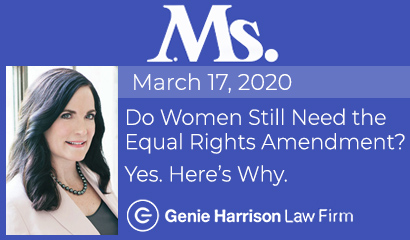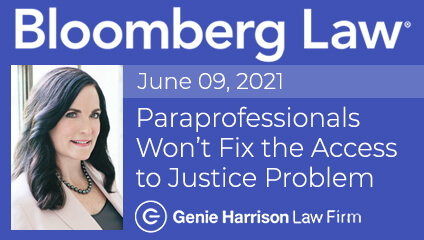Do Women Still Need the Equal Rights Amendment? Yes. Here’s Why.
March 17, 2020 — by Genie Harrison for Ms. Magazine
On January 15, Virginia became the 38th state to ratify the Equal Rights Amendment (ERA).
The ERA, originally passed in 1972, was an attempt to enshrine in the U.S. Constitution the idea that all American citizens regardless of gender have equal rights “in terms of divorce, property, employment, and other matters.” It should have been an uncontroversial concept—but by its 1982 deadline, only 35 of the 38 states necessary had ratified the ERA.
Since then, the ERA has existed in suspended animation: not dead, but in need of CPR.
In our present political climate, the Act appears unlikely to receive the resuscitation it needs. With the extended ratification deadline long past, the House of Representatives passed H.Res 79, on a bipartisan vote of 232 to 183, to reopen the ratification process by eliminating the deadline.
Senate Majority Leader Mitch McConnell has already signaled that he’s opposed, however, and the Department of Justice has ruled that lawmakers must start over again “through the same procedures required to propose an amendment in the first instance.”
Says the Office of Legal Counsel, “Congress cannot revive a proposed amendment after a deadline for its ratification has expired.”
Is ratification merely symbolic? Or does the ERA, 48 years after its passage, need to be enshrined as an amendment to the U.S. Constitution? I would answer the latter question with a resounding: YES.
Don’t get me wrong: Women have made strides over the past 48 years. We are generally able to divorce and own property, and federal laws—such as Title VII and the Equal Pay Act—protect us from sex discrimination in employment and extend the promise of pay equality.
But these laws, intended to ensure equality, have severe limitations. The ERA, finally enacted, should be broader and more protective of our rights.
Take Title VII, for example, which prohibits discrimination in employment based on various protected classifications, including sex. It only applies to employers with 15 or more employee. Meanwhile, the ERA could cover all employers, regardless of the number of people employed.
The Equal Pay Act of 1963 (EPA) requires that men and women receive equal pay for equal work at the same business. Their jobs don’t have to be identical, just substantially equal—a slippery slope that has been litigated to death.
The bottom line is that pay differences based on seniority, merit, production and other factors allegedly other than gender continue to be commonplace. Despite the EPA, women across the country are paid on average only 80 percent of what men are paid. The ERA could and should change that outcome.
State Laws Only Go So Far
Do state laws help make up the gap? Yes and no.
California’s Fair Pay Act requires equal pay for “substantially similar work, when viewed as a composite of skill, effort and responsibility, and performed under similar working conditions.” Men and women must be paid the same amount for comparable work—even if their job titles or work locations are different, and any factor underlying a disparity must be “applied reasonably” and “account for the entire wage differential.” An employer may not use a factor to justify discrimination if an alternative practice would serve the same business purpose without creating a wage differential.
As the Ninth Circuit Court of Appeals just ruled in Rizo v. Yovino, et al. on Feb. 27, a woman’s prior rate of pay is not a “factor other than sex” that allows an employer to pay women less than men for the same work. And, an employer may not retaliate against employees who talk about their pay with one another, who ask the employer about others’ pay to learn about a gender gap or who seek to enforce the equal pay laws.
Yet, despite California’s strong laws, I still get calls from women in low- and high-paying jobs—lawyers, gamers, corporate vice presidents, security guards—who are paid less than their male counterparts. My firm recently took on a class action on behalf of women employees at Riot Games who previously had organized a high-profile walkout against sexual harassment, forced arbitration and unfair pay practices.
Even in California, women still have a long way to go. And California’s law is the most protective in the country, but 18 states have weak laws, and one state has no equal pay laws.
Do we still need the ERA? Yes. Equality at work is a key component of freedom, and we deserve it.
So, write your legislators, agitate, and—most importantly—vote. We cannot afford further erosion of our rights as women.
Read the story above at Ms. Magazine >
About Genie Harrison
Genie Harrison represents plaintiffs in employment and sexual abuse cases as lead trial attorney at the Genie Harrison Law Firm in Los Angeles and is the Vice President of Consumer Attorneys Association of Los Angeles. She credits Ms. as a lifeline, during her college years, to the feminist movement; now, she writes about legal and social issues to provoke action. You can contact her at genie@genieharrisonlaw.com.





